


Select one of the options below:
Social workers are here to advance social justice. With anti-oppressive skills as our foundation, we are anti-racist, promote equity and equality, and enhance human health and well-being across local and global systems.
Colorado State University's program features a nationally recognized advanced generalist approach, ensuring you develop a robust skill set during your master's in social work. Why choose an advanced generalist degree? Advanced generalist practitioners are equipped to work across a multitude of practice settings. As a graduate of our advanced generalist program, you will have the skills to be more holistic in service of your clients, work in policy, and beyond. It also affords you the flexibility to change careers, or better develop a new skill set after you graduate.
With one degree, you’ll be equipped for many career paths. You’ll gain skills to effectively practice with individuals, groups, organizations, and communities. You’ll be a leader, an ally, a communicator, and a strategist.
In addition to the core curriculum, the M.S.W. degree includes built-in electives. With these electives, you can take courses that align with your interests, which includes interdisciplinary electives and graduate certificate courses. You can also gain specialized knowledge by pursuing one of the following graduate certificates:
The master's in social work prepares you for diverse career opportunities. With intertwined coursework and internship experience, you’ll have the opportunity to complete over 600 hours of direct social work practice. There you will apply the knowledge, values, and skills you learn throughout the program in a social work agency setting.
Learn from knowledgeable and respected Colorado State University instructors through a combination of classroom and online coursework. In 2014, the school of social work celebrated two important milestones. The bachelor's program commemorated 40 years of accreditation and the master's program reached the 20-year mark. During this time, CSU's social work faculty have become national leaders in researching and elaborating the concept of “generalist” practice. All faculty bring their practice-based knowledge and diverse areas of expertise to the online classroom experience.
CSU's M.S.W. program is accredited by the Council on Social Work Education, which enables you to pursue professional licensure upon program completion. Additionally, the Master of Social Work is approved by the Colorado Department of Education for school social work licensure, if you elect to complete the additional course requirement (SOWK 560) or seek our graduate certificate in PreK-12 School Social Work.
In this episode, we hear from Mindy Van Kalsbeek, M.S.W. about some of the most rewarding and challenging aspects of being a social worker, including empathy, mindfulness, burnout, policy, social justice, and continuing education.
The hybrid program provides access to a graduate degree with the same accredited curriculum as the on-campus program, but in a different format. The learning format includes a combination of online asynchronous (on your own schedule) learning, synchronous (real-time) online learning, and in-person learning. The majority of instruction is delivered in the online learning environment, with each semester including one in-person class weekend and one synchronous class weekend. This approach allows for flexibility in how students balance work, life, and coursework.
The hybrid program also follows a cohort model of learning, centering the distance student experience in a community-learning environment. In this model, students progress through each course together, getting to engage with the same learning community throughout the duration of the program. Students receive exemplary instruction from experienced faculty while enjoying the benefits of peer support and connection with the cohort.
Note: Tuition rates are reviewed annually and subject to approval by the CSU Board of Governors. To support transparency and long-term planning, tuition increases for the MSW program will be implemented gradually by location and admission term. These increases are designed to phase in gradually to support current students and minimize disruption to their financial planning. Students admitted before the new rates will keep their original tuition for the standard program duration (three years for regular program; two years for advanced standing). Students on alternative academic plans that extend beyond the standard program duration may be subject to future tuition increases. All other SOWK graduate online courses, such as graduate certificate courses, will remain at $725 per credit for academic year beginning Fall 2025 but move to $747 per credit effective Fall 2026.
Colorado State University teaches a nationally-recognized advanced generalist curriculum which consists of foundation courses that follow the core areas of:
The foundation courses also feature a field placement in a human service agency, and coursework on social work values and ethics, populations at risk, diversity, and social and economic justice.
Concentration courses build on the foundation courses to include advanced content on:
The concentration courses also include a field placement, which will be secured for you in the community in which you reside.
**Elective can be any SOWK course offered through CSU Online. Other electives outside the School of Social Work are possible but should be discussed and approved by School of Social Work advisor. Three-year students are required to complete three elective courses, Advanced Standing Students are required to complete one elective course.
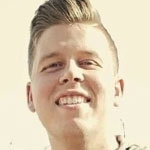
“One of my biggest motivators is the desire to better my community and create systemic change for the children, youth, and families of Colorado. Social workers have a lot to offer, and I am confident my Master of Social Work from Colorado State University will equip me with the knowledge and skills to better serve my community and create more positive outcomes for children, youth, and families in the Child Protection System.”
Hear more about the work Chris is doing on CSU Source
"I would recommend the distance program for anyone wanting to maintain their current connections and life, and who wants a more intimate setting than just another online program can offer.”
"I was thrilled when I was accepted into the M.S.W. distance program. I work full time and I have two kids and a husband, so I needed to find a program that would fit into my lifestyle. I love the fact that this program can be completed online, but also has the opportunity to connect with peers and professors face to face.”
Read more about how Allie planned for success on CSU Source
"I knew this degree was going to lead me to a place where I could make a difference and be fulfilled in the work that I do.”
Read about Julie's experience juggling work, classes, and the COVID-19 pandemic on CSU Source.
Assistant Professor
She/Her/Hers
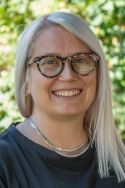
Brittanie Atteberry Ash is an Assistant Professor in the School of Social Work at Colorado State University. Brittanie conducts research to better understand how best to support and build environments that are inclusive and affirming of LGBTQ+ people and communities. Her work relies heavily on an intersectional lens to deepen the discipline’s understanding of risk and resilience among people with marginalized identities. Brittanie received the Council on Social Work Education’s Council on Sexual Orientation and Gender Identity and Expression Scholarship Award two years in a row for scholarly work focused on LGBTQ+ identity and well-being. Brittanie also focuses on promoting social justice and inclusion within social work classroom experiences and identifies strategies for educators to more fully integrate a critical social justice lens into pedagogy. Believing in the power of social work education to transform students into practitioners dedicated to a just world, she is passionate about her work as a critical social work scholar advancing the discipline’s commitment to social justice.
Distance MSW Program Assistant Director, MSW Internship Coordinator
She/Her/Hers

Carolyn Tredinnick is a Distance MSW Program Assistant Director, MSW Internship Coordinator in the School of Social Work at Colorado State University. Tredinnick received her bachelor’s degree from Colorado State University in Sociology and History in 2003. After graduation, she worked in emergency services for the city of Fort Collins before enrolling in CSU's Distance M.S.W. program. Tredinnick then worked for a year in community mental health on the Eastern Plains of Colorado before transitioning to medical social work and working for non-profit hospitals in Weld and Larimer counties for 6 years. During that time, she also served as a Field Instructor for many CSU M.S.W. students.
Director and Professor
She/Her/Hers

Charlotte Bright serves as director and professor of Colorado State University's School of Social Work. Her research interests include gender and juvenile justice, child maltreatment, interpersonal trauma, adolescent and young adult development, service implementation, and quantitative and qualitative methodology. Bright's scholarship has been focused on areas such as juvenile justice services and how they are implemented in communities, gender differences, and the impacts of trauma. Prior to joining CSU, Bright served as associate dean for doctoral and post-doctoral education at the University of Maryland School of Social Work in Baltimore. Bright is editor-in-chief of the journal Social Work Research, is a Society for Social Work and Research Fellow, and has held leadership roles with the Group for the Advancement of Doctoral Education in Social Work.
Instructor
She/Her/Hers

Cheryl Distaso, M.S.W., has more than 25 years experience as a community organizer in Fort Collins. She joyfully teaches concentration year policy and community practice classes in the School of Social Work. Cheryl’s interests include social justice, liberatory practice, Critical Race Theory (CRT), Theater of the Oppressed and Paulo Freirean based praxis. She has presented at various conferences, primarily focusing on white privilege and social justice. In the community, she works on decriminalization of homelessness, immigrant rights, community empowerment, disability rights and increased public transportation. She is committed to the praxis of her community work by utilizing CRT as a theoretical lens; she is equally committed to keeping her social work classes relevant by bringing her real-time experiences to students for inquiry and critique.
Professor Emeritus, Director of the Prevention Research Center Community-University-State Partnerships Division
He/Him/His
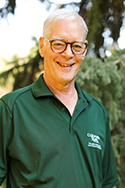
David MacPhee has been a CSU faculty member in HDFS since 1985 (currently professor emeritus), with appointments in the School of Social Work and the Colorado School of Public Health. His research and teaching focus on prevention science, particularly risk and resilience, parenting and family-strengthening interventions, early child development, and diversity, equity, and inclusion. His research-to-practice emphasis revolves around program evaluation.
Assistant Professor
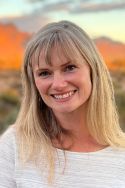
Dr. Elizabeth Kiehne is an Assistant Professor in the School of Social Work at Colorado State University. Prior to completing her doctorate, Dr. Kiehne worked for over a decade with programs responding to and addressing chronically limited opportunity structures for low-income youth, primarily those from immigrant families.
Kiehne currently teaches social policy with social work students, partnering with advocacy organizations and coalitions to support hands-on opportunities to influence policy. She aims to help emerging social workers understand, monitor, and engage in policy and social change work, regardless of primary level of practice, and to support their sense of political self-efficacy.
Through research, Kiehne supports the advancement of applied scholarship that expands understanding of the impacts of social policies on immigrant communities and the need for social policies that promote well-being. As a white, U.S.-born woman engaging in immigration-related research, Kiehne aims to engage in collaborative research that heeds the leadership of those closest to the issues.
Kiehne enjoys talking to emerging social workers about the range of macro practice roles and activities in which they are well-positioned to engage. She is passionate about supporting social workers’ collective attunement to the political mandate of the NASW Code of Ethics, expanding engagement in social and political action and advocacy for policy that is socially, racially, economically, and environmentally just. On Kiehne’s mind as of late is considering what it means for social workers to engage in social justice allyship that is not just active, but also accountable, self-reflective, and self-aware.
Instructor
She/Her/Hers

Eunhee Choi joined the CSU faculty in fall of 2013. She has been a licensed social worker in Korea since 2004 and has field experience in the areas of aging, health, and policy. Dr. Choi worked as a social worker at Migrant Resource Center in Melbourne, Australia, providing home and community care programs for older people from culturally and linguistically diverse backgrounds. Her employment also includes working as a program developer at the Korean Labor Force Development Institute for the Aged (KORDI) in Seoul, Korea, fostering a national Korean Senior Employment Program (KSEP). Dr. Choi worked as an adjunct faculty member at the University of Pittsburgh, teaching M.S.W.-level research courses, including Research Methods and Program Evaluation. She is devoted to building policies and programs that support older individuals who are willing to work or volunteer as a way to remain healthy and active in old age. Her research interests also include racial inequality, health disparity, advanced methodology, theoretical development, and program evaluation.
Instructor
She/Her/Hers

Holly Panetta is an attorney, mediator, and educator at Peak Empowerment LLC, providing mediation services and conflict resolution training. She also serves as a Child & Family Investigator and Parenting Coordinator/Decision Maker. Holly is a former Director of the State of Colorado Office of Dispute Resolution. She served as the Court Programs Manager for the State Court Administrator's Office overseeing the administration of probate, mediation, restorative justice, diversion and problem-solving court programs. She is an adjunct faculty member at Colorado State University teaching courses related to mediation, conflict resolution, family law and social welfare policy. Holly’s prior professional experience includes working as a litigation associate for Henderson, Taylor & Rapp, a law firm in Greeley specializing in family and criminal law. She also served as a Family Court Facilitator in the 19th Judicial District. Holly enjoys spending time with her two young adult children, hiking with her dog, and attending yoga and live music events.
Instructor
She/Her/Hers

Jodie Ball LCSW, LAC, joined the School of Social Work as an adjunct instructor at Colorado State University (CSU) in Fall 2022. Jodie works full time in a semi-private practice setting providing mental health psychotherapy supported by Neurofeedback. Jodie creates a comfortable and safe environment, where all feel welcomed and at ease to learn and to grow. Her passion is to support those around her to claim their natural strength and greatness, empowering them to navigate, and even overcome, the roadblocks that life throws our way. Jodie has 7 years of experience working as an outpatient therapist with almost all populations and issues, yet her specialties include working with addiction and recovery, trauma, grief and loss, children and adolescence, horticultural therapy, coping with mental illnesses, and utilizing Neurofeedback support within the therapeutic setting.
Instructor
He/Him/His

Jordan Brooks holds a Bachelor of Arts from Eckerd College and a Master of Social Work from University of South Florida. His research areas of interests include: conceptualizations of mental health, social justice, queer affirmative social work, and psychodynamic psychotherapy.
Instructor
She/Her/Hers

Kristin Mooney holds an M.S.W. from The University of Denver, Mental Health Concentration / Substance Abuse Certificate Program and a B.A. in Psychology from Stanford University with a Specialization in Hu-man Health and Development. Her research areas of interest include: family therapy, substance use, men-tal health, delinquency, children and youth.
Director of Field Education and Programs
She/Her/Hers
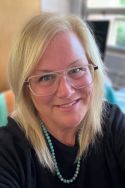
Dr. Leah Cleeland is the Director of Colorado State University’s School of Social Works’ Field Education Programs. She brings experience in direct social work practice, research, and higher education to her current position. After completing a Master’s Degree in Social Work at the University of Denver, specializing in Children, Youth, and Family Services, Leah worked for over 10 years in direct practice in Colorado and Illinois. She worked in a variety of roles including as an HIV counselor and educator, substance use and mental health counselor, patient services coordinator for the American Cancer Society, and with community health and human services providing case management and permanency planning.
On-Campus MSW Program Assistant Director/Senior Instructor
She/Her/Hers

Marie Villescas Zamzow holds an M.S.W. from Smith College School for Social Work, a B.S.in Psychology from Colorado State University, and a B.A. in Social Work from Colorado State University. Her Research areas of interest in-clude: mental health, child welfare, diversity, work with families and children, and creating social action. Marie received a Best Teacher Award in 2017 from the Colorado State University Alumni Association.
MSW Program Director/Senior Instructor
She/Her/Hers

Mindy Van Kalsbeek holds an M.S.W. from Colorado State University School of Social Work and a BSW from Dordt College. Her Research areas of interest include: intellectual and developmental disabilities, mental health, and organizational and nonprofit management.
Ph.D. Student, GRA
They/Them/Theirs
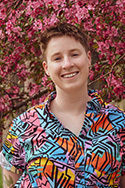
Quinn is a white, transgender, and queer individual born and raised in the United States. Quinn seeks to advance social work practice by pushing the institute of academia away from the status quo and toward justice and equity. In their work, Quinn aims to be reflective of how their positionality has influenced the research questions they ask and the conclusions they draw. They strive to interrogate their whiteness in the context of the continual reproduction of white supremacy within the field of social work.
Instructor
She/Her/Hers

Sofia Gentry received a B.A. in Sociology from the State University of New York at Geneseo and earned her M.S.W. degree from LSU's distance learning program while living in Hawaii. After graduating, Sofia spent time working as a school social worker within an alternative high school of Aurora, CO serving primarily immigrant, refugee and asylee students. During that time, Sofia prioritized improving mental health support and creating programs to address increasing rates of teen pregnancy and substance use among marginalized youth. After this position, Sofia further specialized in trauma treatment and trauma-informed care. She currently provides trauma-focused psychotherapy to adolescents and adults in the state of Colorado. In addition to her work in private practice, Sofia volunteers in Spark the Change Colorado's mental wellness program. Sofia also serves as a member of Violet's Clinical Review Board.
Graduate Programs Coordinator
They/Them/Theirs

Timothy Frank currently serves as a Graduate Programs Coordinator for the M.S.W. program. Frank holds a Graduate Certificate in IT Project Management from Colorado State University and a Graduate Certificate in Business Intelligence, also from CSU.
We offer a program that supports independent learning combined with collaborative application. Online coursework prepares students for further content exploration and synthesis during the in-person, weekend class. The ability to lead both direct and indirect client-centered interventions is crucial to success in social work settings, making the student-to-student activities an invaluable learning experience.
"Advanced Standing" refers to the level of experience of a student applying to the program. Students who have a bachelor's in social work may be able to start the program with Advanced Standing status.
To qualify for the Advanced Standing program, you must have earned a bachelor's degree in social work from a CSWE-accredited program within the last seven years. Previous work or life experience does not count toward eligibility for Advanced Standing status. Advanced Standing students skip the first year in the program and join their cohort starting in year two. Additionally, the credit requirement is lower, as is the number of service hours required.
| Earned a BSW? | M.S.W. credits required | M.S.W. service hours required | |
|---|---|---|---|
| Traditional | No | 62 | 900 hours |
| Advanced Standing | Yes | 39 | 630 hours |
The advanced generalist model in our M.S.W. program places emphasis on the knowledge and skills needed for interventions at multiple levels of practice, including individuals, families, groups, and communities. Other central themes are direct services, community and organizational practice, social policy analysis, and social work research.
The advanced generalist model in CSU’s M.S.W. program provides students with an increased ability to demonstrate advanced generalist competencies; integrate research into practice; analyze value and ethical dilemmas; add greater depth to the provision of service; and provide the skills to function as more independent social work practitioners. Additionally, this advanced skill level allows graduates to engage in interdisciplinary, collaborative public and private partnerships for advocacy, policy, practice, and advancing social justice.
Generalist social work is regarded both as a perspective and a practice approach because the social worker is taught to recognize the impact, influence, and potential resources available from the context where practice occurs.
The Traditional M.S.W. program is three-years and the Advanced Standing program is two-years. Review the above information to determine if you may be eligible for Advanced Standing. Both are part-time cohorts that include in classroom experience two weekends per semester and online instruction.
Yes, once you have submitted your CSU Graduate School Application (a short form and an application fee) you will be assigned an ID number. At that point you can begin working with CSU Office of Financial Aid to obtain financial aid. Eileen Griego, in that office, works directly with our distance M.S.W. students.
A comprehensive scholarship search tool is available on the College of Health and Human Sciences website.
Our program does not accept transfer students from other programs.
CSU’s Graduate School requires an overall undergraduate career GPA of 3.0 or above for unconditional admission. The School of Social Work’s Admissions Committee does not use GPA as a judgment metric, but instead rates applicants based on other factors as demonstrated through the answers to the essay questions in the application, an understanding of human service work, and references. Our admissions reviewers are able to advocate for strong candidates who have a cumulative undergraduate career GPA of at least 2.8, up to 3.0. If the Graduate School is convinced and offers admission, it would be conditional upon maintaining a 3.0 minimum GPA in the M.S.W. program for the first semester.
For those interested in applying but who have a career undergraduate GPA below 2.8 the Graduate School offers the Access Pathway. This requires an applicant to successfully complete at least six credits of regular, graduate-level coursework through CSU with a GPA of at least 3.0 to be considered for admission. Please refer to the CSU General Catalog’s Graduate and Professional Bulletin for more information.
Attendance is critical, as each in-person learning weekend represents a significant part of that semester's class time and learning activities. Each instructor determines attendance requirements for the class they teach, in alignment with the Program’s Attendance Policy. To review the Attendance Policy, refer to the M.S.W. Program Handbook.
Yes, prerequisite requirements include a minimum of 18 credits (6 standard college-level courses) of interdisciplinary liberal arts coursework, spanning social, behavioral, and biological sciences.
These courses must be completed and transcripts received by the first day of classes.
| Cohort | Application Identifier | Application Opens | Priority Deadline | Final Deadline | Start Term | Years Attending |
|---|---|---|---|---|---|---|
| Fort Collins Advanced Standing | Social Work (M.S.W.) - Fort Collins | March 1, 2025 | Aug. 1, 2025 | Oct. 1, 2025 | Spring 2026 | 2026-2027 |
| Denver | Social Work (M.S.W.) - Denver | March 1, 2025 | Aug. 1, 2025 | Oct. 1, 2025 | Spring 2026 | 2026-2028 |
| Denver Advanced Standing | Social Work (M.S.W.) - Denver | March 1, 2026 | Aug. 1, 2026 | Oct. 1, 2026 | Spring 2027 | 2027-2028 |
| Boulder | Social Work (M.S.W.) - Boulder | March 1, 2026 | Aug. 1, 2026 | Oct. 1, 2026 | Spring 2027 | 2027-2029 |
| Boulder Advanced Standing | Social Work (M.S.W.) - Boulder | March 1, 2027 | Aug. 1, 2027 | Oct. 1, 2027 | Spring 2028 | 2028-2029 |
| Fort Collins (3-year) | Social Work (M.S.W.) - Fort Collins | March 1, 2027 | Aug. 1, 2027 | Oct. 1, 2027 | Spring 2028 | 2028-2030 |
Start your application online and upload materials directly into the online system. You can save your progress and return any time.
Apply NowAdmission to the Social Work (M.S.W.) degree has the following requirements:
Advanced Standing Program:
Only students who hold a bachelor’s degree in social work, obtained within the past 7 years from a fully accredited school of social work, are eligible to apply for the Advanced Standing M.S.W. program.
The following are the minimum requirements for admission to the Advanced Standing program:
Note that meeting the minimum department standards does not ensure admission to the program. Admission to Colorado State University graduate programs is based on a number of factors, including prior academic and professional experience and the personal statement.
Detailed instructions will be available as part of the graduate admissions application process once you create your login. The materials you will prepare for your online application include:
How does your lived experience inform your skillset as related to our program?
Tell us how your background and life experiences contributed to you choosing social work as a career. Describe your current practice interests and/or future career goals. Share how the M.S.W. program will contribute to your current and/or future social work practice.
Describe your understanding of oppression and social justice. Include an example of how you demonstrate your commitment to social justice in your professional or personal life. Reflect on an instance when you recognized privilege and/or oppression in your professional and/or personal life and describe your response. Describe how your understanding of oppression and your commitment to social justice have evolved over time.
Colorado State University encourages full and open expression by students; please know we will respond to any reported disclosures related to sexual misconduct and interpersonal violence. If your submission contains information related to past or present sexual misconduct or interpersonal violence, you may receive an outreach from CSU’s Office of Title IX Programs to discuss reporting options and available support resources. For more information, please visit https://titleix.colostate.edu.
Complete the online graduate application and pay the nonrefundable application processing fee (payable online). As soon as you have completed the required information, please submit your application. Your application will not be reviewed until it is complete and all required materials have been received.
CSU's Graduate School offers several application fee waiver opportunities. Visit their website to determine if you are eligible for a waiver.
Application Timelines
| Cohort | Application Identifier | Application Opens | Priority Deadline | Final Deadline | Start Date of Program | Years Attending |
|---|---|---|---|---|---|---|
| Denver | Select “Social Work (M.S.W.) – Denver” when choosing the program of study | March 1, 2025 | August 1, 2025* | October 1, 2025 | January 2026 | 2026-2028 |
| Fort Collins Advanced Standing | Select “Social Work (M.S.W.) – Fort Collins” when choosing the program of study | March 1, 2025 | August 1, 2025* | October 1, 2025 | January 2026 | 2026-2027 |
*We strongly encourage you to submit your application by the priority deadline. The application may close after the priority deadline but before the final deadline contingent upon the volume of applications received.
Request one official transcript of all collegiate work completed from all institutions attended. Transcripts from Colorado State University are not required. Transcripts must be received directly from the originating institution to be considered official.
Please Note: Students may be unconditionally admitted and registered in their first semester of courses with an unofficial transcript. Official transcripts must be submitted, prior to or during your first semester, before you can register for your second semester of graduate work. Failure to meet this condition will result in your dismissal from the Graduate School.
Electronic (preferred): Digital Transcripts must be submitted by the originating institution using a secure service such as parchment, eScrip-Safe, the National Student Clearinghouse, or e-Quals. Transcripts received via emails are considered unofficial. Use institution code 4075 for Colorado State University or gradadmissions@colostate.edu if the secure service requires an email address.
Mail (if necessary) Graduate Admissions Colorado State University – Office of Admissions 1062 Campus Delivery Fort Collins, CO 80523-1062
View your application status at any time to ensure your application checklist is complete or to check on updates.
Applications received by the priority deadline are reviewed in random order, beginning after the priority deadline has passed. Applications received after the priority deadline are reviewed later, in the order received, and placed on the waitlist in the same order if recommended for admission and the cohort is full. Applicants generally receive their decision from three weeks to three months after the review.
The final decision is communicated via email using the email address you used in the application process.
Proof of English language proficiency is required for applicants from countries or United States territories where there are official languages other than (or in addition to) English. This includes the U.S. territories of American Samoa, Guam, the Northern Mariana Islands, and Puerto Rico.